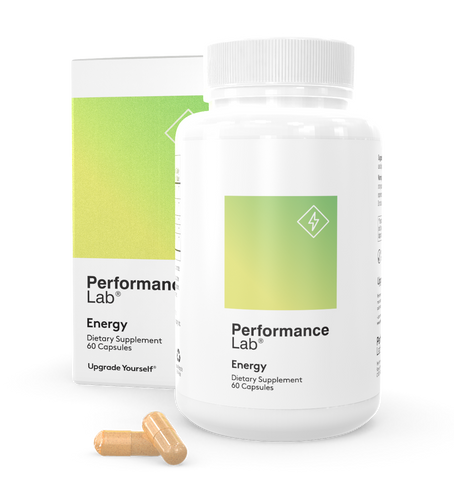Pyrroloquinoline quinone—we bet that took more than one try to say. More simply known as PQQ, pyrroloquinoline quinone has gained a lot of attention in the health and wellness space. Most people have no idea what the compound is, but the claims associated with it are sure to bring it to your attention.
It’s suggested that PQQ supplements can improve energy, enhance mental focus, and increase longevity, but is there actual merit to these claims?
We’re digging through the research and giving you everything you need to know about PQQ—what it is, the benefits of supplementing it, and any safety and side effects you should know beforehand.
What Is Pyrroloquinoline Quinone?
Pyrroloquinoline quinone (PQQ) is an incredibly important dietary antioxidant that is found in several foods, including leafy vegetables, fruits, and legumes, especially soy, but is also found in high concentrations in human breast milk 1. Humans cannot synthesize PQQ, so it must come through food.
PQQ is involved in several important biological functions and has been shown to possess survival benefits (optimizing neonatal growth, reproductive performance, hepatic and muscular functions, mitochondriogenesis, etc.), as well as offering neuroprotection, improving cognitive and immune function, and supporting antioxidant defenses 1.
Although PQQ isn’t classified as a “vitamin,” it serves many critical functions in the body, which means getting sufficient amounts through diet is key for optimizing performance.
What Does It Do?
So, how does this relatively unknown compound actually promote all these amazing health benefits?
The exact function of PQQ in humans isn’t well understood, but anyone choosing to supplement with PQQ usually does so for its powerful antioxidant properties. It’s thought to be involved in modulating the activity of NAD-requiring dehydrogenases, protecting nerve cells against damage, and stimulating mitochondrial biogenesis to support energy production and metabolic function 1-3.
Other studies also show potential for PQQ in preventing the decline of brain function in older adults, especially working memory and attention, as well as reducing blood sugar levels 4-7, although the mechanism behind how isn’t clear.
Health Benefits Of PQQ
1. Enhances Mitochondrial Biogenesis
Have you ever stopped to think about what powers your body? When you dive into human physiology, you’ll find tiny little organelles called mitochondria that produce the majority of ATP needed for cells to function.
They are essentially the “powerhouse” of all cells, except for red blood cells. On a daily basis, we turn over approximately our own body weight in ATP, and almost all of this ATP is generated by mitochondria, primarily within muscles, the brain, liver, heart, and GI tract 8.
There’s a large body of evidence linking mitochondrial dysfunction with several chronic diseases, especially diseases of aging, and research shows that improving mitochondrial respiratory control may be key to a number of health issues 8.
Studies show that PQQ supplementation may enhance mitochondrial function and biogenesis and improve metabolic homeostasis 9; deficiency of PQQ leads to reductions in hepatic mitochondrial content by up to 30% and suppresses mitochondrial respiration.
However, PQQ supplementation can boost mitochondrial biogenesis via activation of cAMP response element-binding protein (CREB) and peroxisome proliferator-activated receptor-γ coactivator-1α (PGC-1α), a pathway involved in regulating the production of new mitochondrial 10.
2. Antioxidant Properties
Reactive oxygen species are a natural byproduct of normal metabolic functions, and while the body is equipped with an antioxidant defense system that protects it against damage, dietary antioxidants are also critical to support this system.
There are several potent antioxidants that boost endogenous defenses, but research shows that PQQ is particularly effective for protecting mitochondria against oxidative stress-induced lipid peroxidation, protein carbonyl formation, and inactivation of the mitochondrial respiratory chain 11.
Vitamin C is one of the most powerful water-soluble antioxidants, and studies show that the aroxyl radical-scavenging activity of PQQH2 (the reduced version of PQQ) was 7.4-fold higher than vitamin C. The singlet oxygen quenching activity of PQQH2 was 6.3-fold higher than that of vitamin C 11. How’s that for powerful?
3. Neuroprotection and Cognition
Of all the organs in the body, the brain is most susceptible to oxidative stress due to its high fat content, which means consuming compounds that protect against damage is key to maintaining cognitive function.
Neuronal death due to oxidative stress is a major factor in the development of neurodegenerative diseases like Alzheimer’s and Parkinson’s 9.
One study found that PQQ can enhance the production of NGF, a protein composed of 118 amino acid residues that are a known neurotrophic factor required for the development and maintenance of peripheral sympathetic and sensory neurons 9. Studies show that PQQ exhibits a stimulatory effect on NGF synthesis and secretion.
What’s more, PQQ may enhance cognitive function by boosting cerebral blood flow and oxygen metabolism. A 2016 study investigated the effects of PQQ on regional cerebral blood flow (rCBF) and oxygen metabolism in the prefrontal cortex (PFC) before and after administration of PQQ 12.
Twenty participants were given 20mg BioPQQ™ or a placebo orally once daily for 12 weeks. Results showed that concentrations of hemoglobin and total hemoglobin increased with PQQ supplementation and tissue oxygen saturation decreased, suggesting that PQQ may enhance cognitive function.
4. Regulates Blood Glucose
Type 2 diabetes and other metabolic diseases that involve poor glucose regulation are a massive problem worldwide, and while treatment entails more than just supplementation, PQQ has been shown to be a potential therapeutic agent to help regulate glucose and insulin function.
Because mitochondria regulate pathways involved in metabolic homeostasis and cellular function, studies suggest that long-term exercise and diet intervention can reverse, or at least partially reverse mitochondrial deficiency and improve metabolic flexibility and insulin sensitivity in patients dealing with type 2 diabetes 9.
Of the treatment options, studies show that PQQ supplementation can enhance mitochondrial function and biogenesis and improve metabolic homeostasis. Perhaps more importantly, PQQ may help reverse mitochondrial alterations and metabolic impairment, which may improve lipid profile in diabetics 8.
Additionally, research suggests that redox recycling of PQQ may cause ligand-independent activation of insulin signaling, resulting in increased cellular glucose uptake.
Because the mechanics behind how PQQ may improve blood glucose is complex, long story short is that studies show oral administration of PQQ for just two weeks can improve impaired glucose tolerance in type 2 diabetics and thus serves as a potent anti-diabetic agent.
PQQ Safety And Side Effects
Research shows no evidence of acute side effects or overt toxicity from PQQ supplementation less than or equal to 60 mg per day 13. However, in excessively high doses, PQQ may increase the risk of kidney damage 14.
The Best Form
While PQQ is widely available in several food sources — spinach, parsley, carrots, oranges, tomatoes, bananas, dark chocolate, green tea—it’s also frequently consumed in supplemental form.
But like every other supplement, some forms are more effective than others. For PQQ, we’re talking about BioPQQ—a cutting-edge, water-soluble form of pyrroloquinoline quinone that’s also the most research-based PQQ form on the market.
In Performance Lab Energy®, BioPQQ works in conjunction with CoQ10 to boost, multiply, and protect mitochondria powerhouses in nearly every cell in the body. It’s designed to upgrade your natural production of cellular energy and power up all metabolic processes.

Energy® is a clean, smart stack of advanced form nutrients that boost mitochondrial function and support efficient energy production for next-level performance.
References
- KR Jonscher, RB Rucker. Chapter 13- Pyrroloquinoline Quinone: Its Profile, Effects on the Liver and Implications for Health and Disease Prevention. Dietary Interventions in Liver Disease. 2019:157-173.
- K Saihara, R Kamikubo, K Ikemoto, K Uchida, M Akagawa. Pyrroloquinoline Quinone, a Redox-Active o-Quinone, Stimulates Mitochondrial Biogenesis by Activating the SIRT1/PGC-1α Signaling Pathway. 2017;56(50):6615-6625.
- L Zhang, J Liu, C Cheng, et al. The neuroprotective effect of pyrroloquinoline quinone on traumatic brain injury. J Neurotrauma. 2012;29(5):851-864.
- Y Itoh, K Hine, H Miura, et al. Effect of the Antioxidant Supplement Pyrroloquinoline Quinone Disodium Salt (BioPQQ™) on Cognitive Functions.Adv Exp Med Biol. 2016;876:319-325.
- M Nakano, Y Murayama, L Hu, K Ikemoto, T Uetake, K Sakatani. Effects of Antioxidant Supplements (BioPQQ™) on Cerebral Blood Flow and Oxygen Metabolism in the Prefrontal Cortex.Adv Exp Med Biol. 2016;923:215-222.
- M Takada, M Sumi, A Maeda, et al. Pyrroloquinoline quinone, a novel protein tyrosine phosphatase 1B inhibitor, activates insulin signaling in C2C12 myotubes and improves impaired glucose tolerance in diabetic KK-A(y) mice.Biochem Biophys Res Commun. 2012;428(2):315-320.
- N Kumar, A Kar. Pyrroloquinoline quinone (PQQ) has potential to ameliorate streptozotocin-induced diabetes mellitus and oxidative stress in mice: A histopathological and biochemical study.Chem Biol Interact. 2015;240:278-290.
- MD Brand, AL Orr, IV Perevoshchikova, CL Quinlan. The role of mitochondrial function and cellular bioenergetics in ageing and disease. Br J Dermatol. 2013;169 Suppl 2(0 2):1-8.
- M Akagawa, M Nakano, K Ikemoto. Recent progress in studies on the health benefits of pyrroloquinoline quinone. Biosci Biotechnol Biochem. 2016;80(1):13-22.
- W Chowanadisai, KA Bauerly, E Tchaparian, A Wong, GA Cortopassi, RB Rucker. Pyrroloquinoline quinone stimulates mitochondrial biogenesis through cAMP response element-binding protein phosphorylation and increased PGC-1alpha expression.J Biol Chem. 2010;285(1):142-152.
- K He, H Nukada, T Urakami, MP Murphy. Antioxidant and pro-oxidant properties of pyrroloquinoline quinone (PQQ): implications for its function in biological systems. Biochem Pharmacol. 2003;65(1):67-74.
- M Nakano, Y Murayama, L Hu, K Ikemoto, T Uetake, K Sakatani. Effects of Antioxidant Supplements (BioPQQ™) on Cerebral Blood Flow and Oxygen Metabolism in the Prefrontal Cortex. Adv Exp Med Biol. 2016;923:215-222.
- CR Smidt, FM Steinberg, RB Rucker. Physiologic importance of pyrroloquinoline quinone.Proc Soc Exp Biol Med. 1991;197(1):19-26.
- M Nakano, H Takahashi, S Koura, C Chung, S Tafazoli, A Acute and subchronic toxicity studies of pyrroloquinoline quinone (PQQ) disodium salt (BioPQQ™) in rats.Regul Toxicol Pharmacol. 2014;70(1):107-121.















